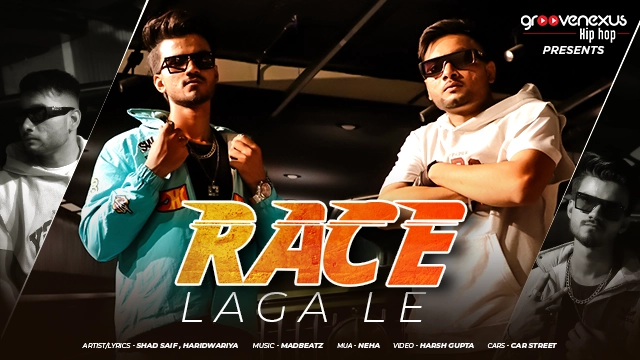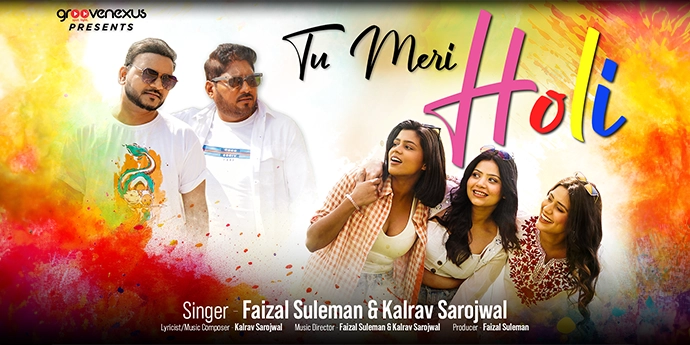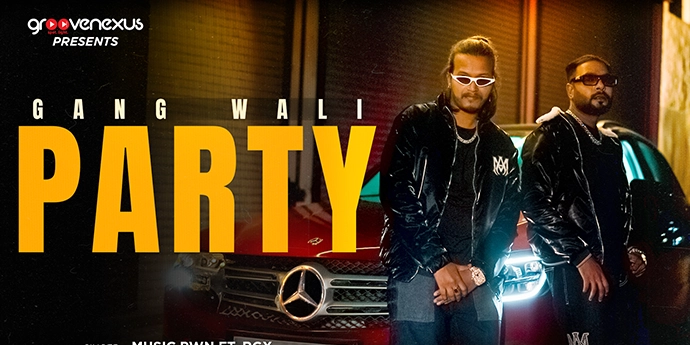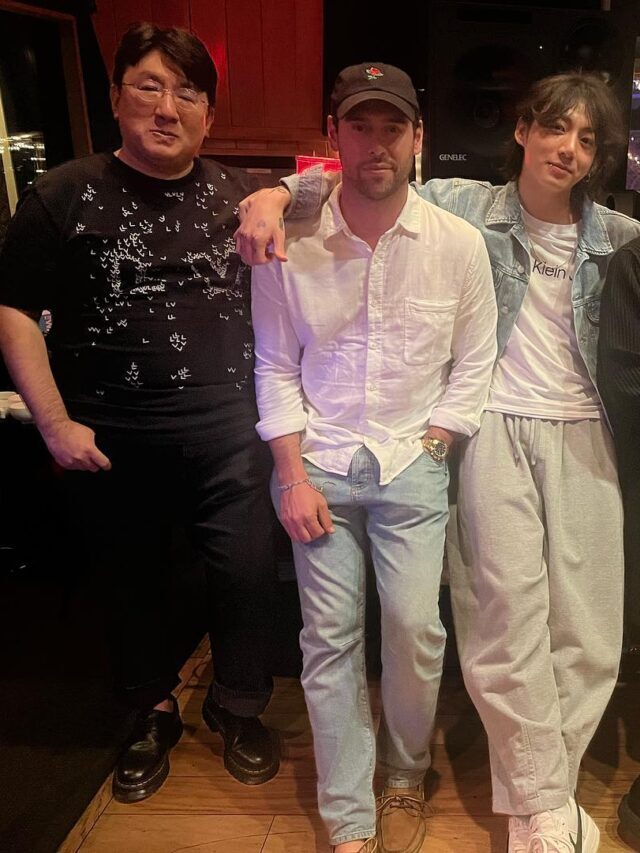Table of content
- Introduction:
- What is SEO for Music Artists?
- Why music artists need SEO optimization?
- What are the types of relevant SEO for musicians?
- How do search engines function?
- What is the process of SEO for Musicians?
- What are the Pros and Cons of SEO for Music Artists?
- A Guide on SEO for Music Artists
- What are the SEO Checklist for Music Artists?
- Conclusion
Introduction:
Lack of awareness about the importance of SEO in musician’s life, makes them negligent about it. We will discuss how an SEO can help you to boost your career and grow exponentially in the music industry.
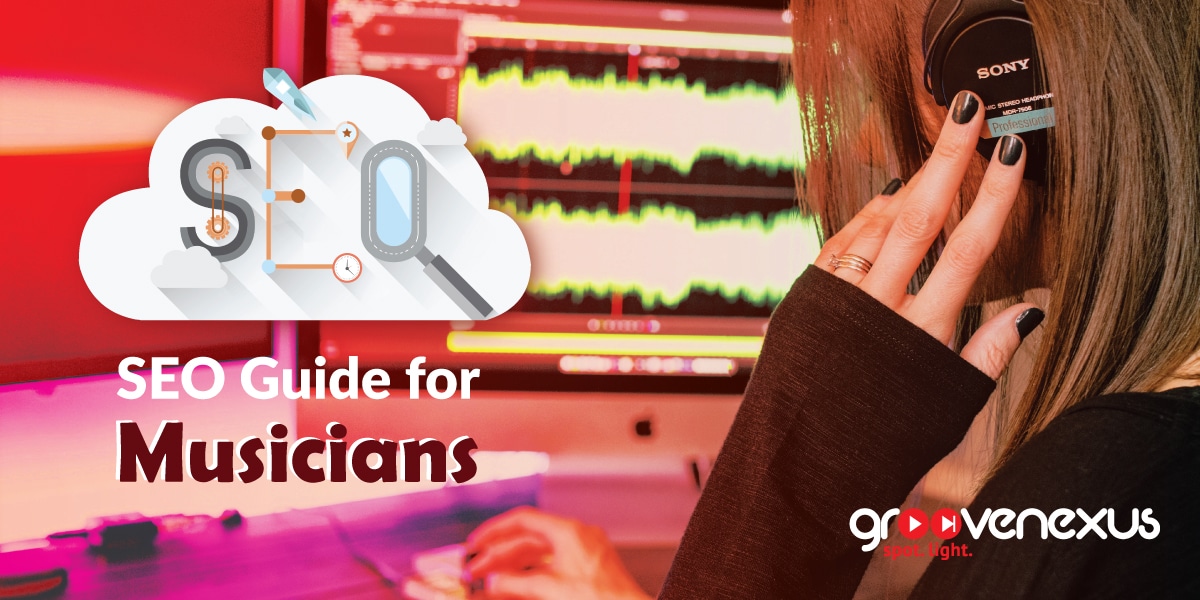
An adequate strategy around SEO for musicians can help gain massive reach to the audience, new fans, and retarget old ones. Don’t worry, and you have don’t have to courses on digital marketing to be an expert; we have made things simple and easily understandable for you. Let’s begin with the basics.
What is SEO for Music Artists?
As an artist, you might think, does Search Engine Optimization (SEO) make sense for musicians? SEO is a marketing tool that is relatively unknown and underused in the music industry. An acronym for ‘search engine optimization,’ SEO is a practice of growing quality and quantity of traffic and brand exposure through organic (unpaid) search engine results.
SEO is as much about people as it is about search engines themselves. It is about understanding what people might look for online, their words for the search, and the kind of content they wish to consume. Knowing the answers to these questions will allow you to connect with your niche audience.
If knowing your audience’s intent is one side of the SEO, delivering it in a search engine crawler-friendly way is the other.
With us, learn to do both.
Why music artists need SEO optimization?
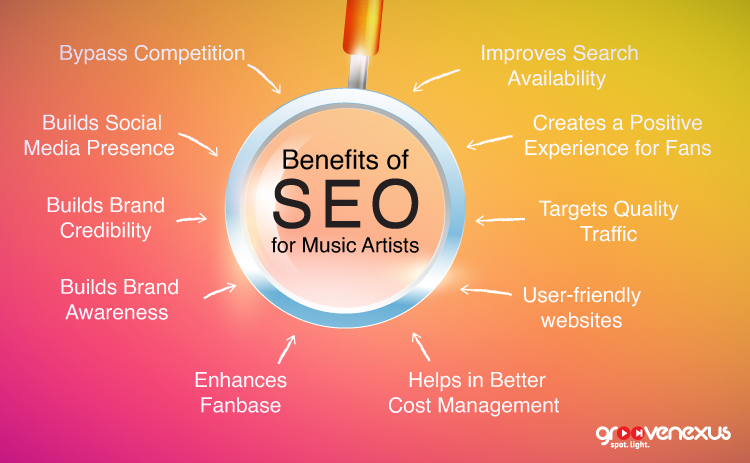
Covid-19 has changed the entire music industry, with the global lockdown everything has gone digital. This increase in the digital presence of the people has created a lot of opportunities for artists to catch their attention online. So how your brand will bypass the competition and be on top of the list?
Here comes the SEO, it’s benefits for an artist to get the success he/she deserves are unfathomable. A highly effective social media marketing for musicians combined with SEO is vital to tap online fans, to gain an audience, and be recognized in this age and time.
Let’s take you through some features of doing SEO as a musicain:
i) Improves Search Availability:
SEO is required to enhance one’s visibility on searches or suggestions in any search engine or platform they are in, Leading to more reach and fan following.
ii) Creates a Positive Experience for Fans:
When a musician is found easily on the search engine, it will create a lasting and good experience for a fan. As a result, the fans will start following up on the musician regularly.
iii) Targets Quality Traffic:
Being an inbound marketing strategy is one of the chief advantages of SEO. Unlike traditional outbound channels, involving reaching out to fans whether they want to hear from you, inbound methods centres on making it easy for your audience to find you when they want.
Inbound is, on the other hand, more fan centric. Instead of interrupting, it makes information easily accessible. When fans are ready to spend some time researching your music, they can find you independently.
iv) User-friendly Websites:
SEO aids in making your website faster, smoother, and user-friendlier. Although people still believe that SEO optimization is applicable only to search engines, SEO today helps make your website experience complete. A well-structured and uncluttered website for musicians compels a fan to stay a little longer, there increasing page views and decreasing bounce rate. Properly optimized and relevant content keeps the readers happy as you solve their curiosity to know more.
All of these are inter-related. When you keep your reader/visitors happy, search engines become more satisfied with your website because search engines love to serve high-quality information to their consumers.
v) Helps in Better Cost Management:
SEO for music artists lowers their advertising costs. Here’s how:
When you already have a top ranking on search engines, there is no need for you to pay per click or advertise your website separately. You will continue to stay on top of the search results as long as fans click your links.
Additionally, activities affecting inbound traffic generation include social media management, blogging, referrals, etc. All of these have little or no cost at all. Moreover, having a good ranking and reach also adds to your opportunities to earn money as an artist.
vi) To bring in more:
Website makes you stand out of the crowd of competition around. Music artists who have SEO-optimized websites bring more fan base to their site and gather more fandom.
SEO is, by far, the most efficient and affordable marketing strategy. It brings niche traffic to your site. The best part of SEO is one can literally keep track of every activity on their page. You’ll know exactly where you need to work more to be better.
v) Builds Brand Awareness:
The audience will trust your credibility more if your website ranks on top of major search engines. Also, the industry people would want to find you there. A website being your one-stop destination adds value to your name and if you’re unable to rank on search engines with your site, then all your time and money invested goes to waste.
Search engines play a significant role in making or breaking your brand identity.
vi) Builds Brand Credibility:
Ranking on top gives your fans the idea that you are one of the top musicians in the industry. It shows that you are popular, and many have searched for you. Thus, they trust in your brand, especially in search engines for music like SoundCloud, Spotify, etc.
vii) Builds Social Media Presence:
As users visit your website, they will most likely click on your social media icons and eventually follow you.
viii) Bypass competition:
You will need flair better than your competitors and rank better in local search results on being SEO optimized.
What are the types of relevant SEO for musicians?
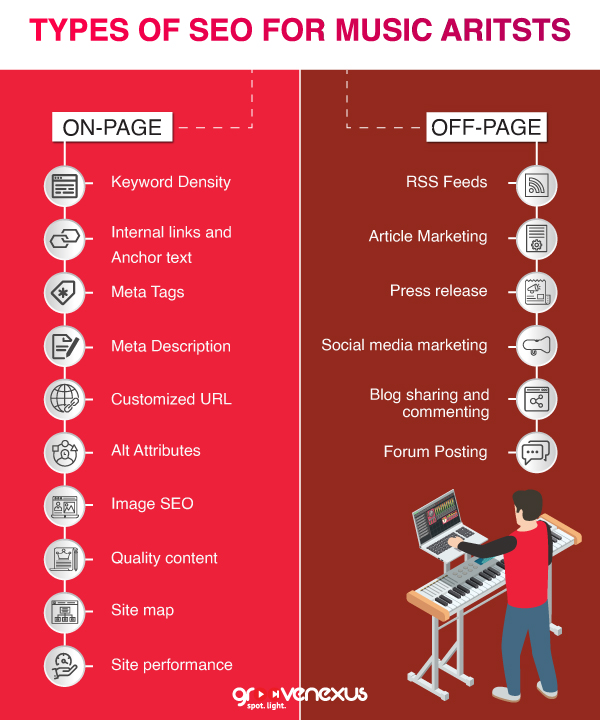
There are two types of SEO’s that can be useful for musicians-
- On-Page SEO for musicians:
Activities carried out on the page that is to be published, that is, the tasks that help optimize a given page such that it appears higher on the search engine result pages.
These activities primarily include infusing keywords in the accurate density, meta description, meta tags, building a customized URL, inserting internal links, inserting the alt attributes, image SEO, and most significantly, providing the users with quality content. (Discussed in detail below)
- Off-Page SEO for musicians:
Activities performed on a page after it goes live on the web.
This includes sharing and commenting on the post to build engagement, liking the post on your different social media handles, giving star ratings, answering queries of the target audience, etc.
How do search engines function?
Search engines are answering machines. Every minute, they polish more than a billion pieces of data, access, and evaluate thousands of factors to determine the apt content, most likely to answer your question.
Search engines do this by discovering and cataloguing all accessible content on the Internet (PDFs, web pages, images, videos, etc.) via a process known as “crawling and indexing.” That is followed by chronologically organizing it by matching the query in a process; that we refer to as “ranking.”
List of Search Engines:
- YouTube
- Bing
- Yahoo
- Ask.com
- AOL.com
- DuckDuckGo
SEO means making the web pages easier to understand for search engine and music/ videos in case of music search engine, but how exactly does that function?
In SEO, ranking refers to your content’s placement on search engine results pages (SERPs). A no. 1 ranking means that your web page is the first result (apart from promoted results) when people search for a particular keyword.
Appearing in the top three results is brilliant because almost half of the clicks on any search results page go to those positions.
What is the process of SEO for Musicians?
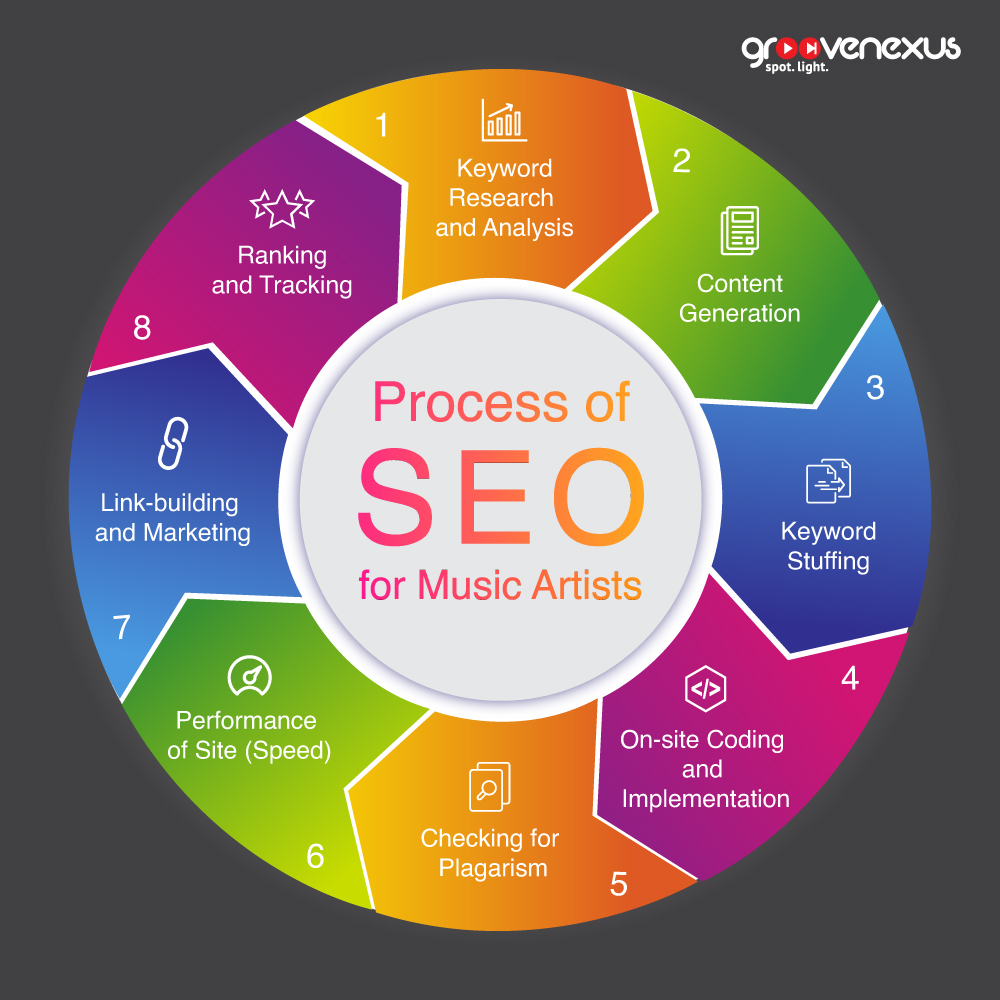
SEO is a layered concept, and therefore, you must understand the step-by-step process to become an expert SEO for musicians.
First, comes the research and analysis part where you need to look for suitable keywords or key phrases for your website content. The keywords must align directly with the messaging you’re trying to put forth.
Next in lines falls content generation around your selected keywords. It is generally advised to write naturally first and then go ahead with keyword stuffing in your content.
Once the content is ready in alignment with your music and messaging, your site will undergo coding and implementation for the content generated. Many people overlook the next step, but one must not. Plagiarized content can be severely penalized.
Next, comes the site performance and optimization for speed. This ensures that your site loads on time for your fans to stay and navigate through your site better.
Once your content is published, link building, for relevant backlinks and marketing, is essential. This also helps in building and enhancing your website’s credibility and trust score. Therefore, aiding in better ranking.
Finally comes tracking, where you track your metrics of efforts put in to find out your problem areas and strong areas.
What are the Pros and Cons of SEO for Music Artists?
Just like all the fine factors, we believe that every coin has two sides. SEO helps you rank better, but does it only do good? Let us take a look at the advantages and disadvantages of SEO.
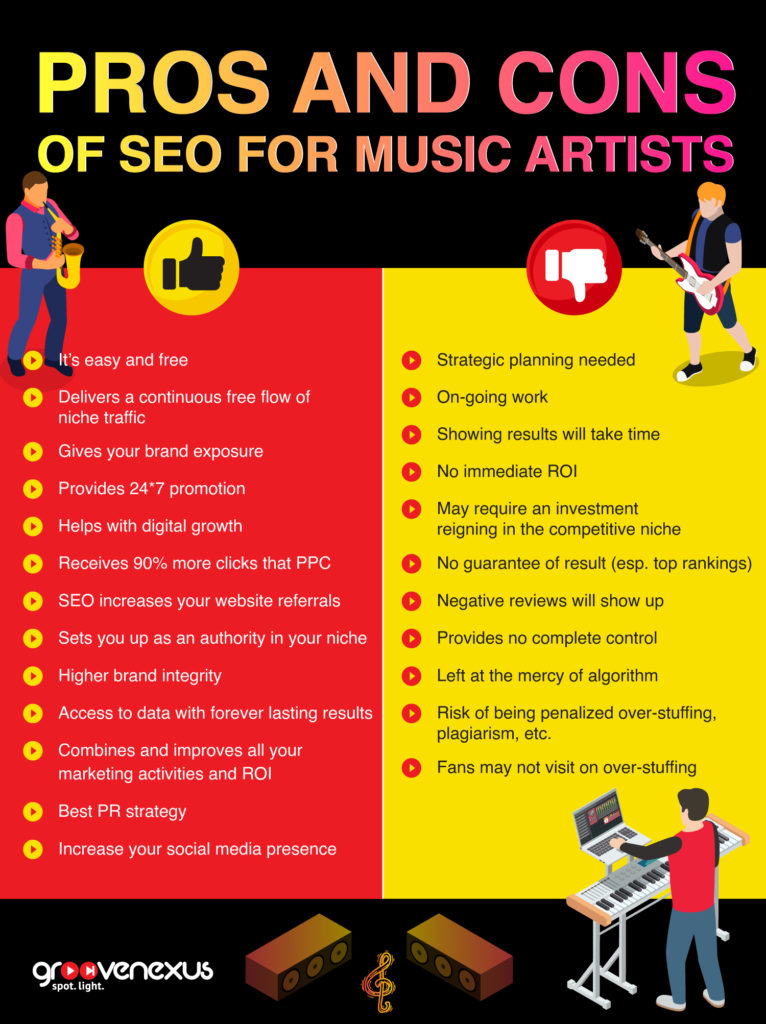
A Guide on SEO for Music Artists
If you want your website’s pages to be found by Google, you need to make it easy for Google to read through them.
A musician’s guide to improving SEO on your own | Knowing all about Optimization through Best Practices
Here are some things you can do to help improve the metrics for your website to increase traffic from search engines.
i) Title Tags
Music artists use generalized, single-word headings for their pages like about, gigs, tours, etc. If people are looking for your merch or tour dates, they’re likely to include your artist’s name in the search (take for example – Alan Walker Tour Dates)
Due to this, a better approach to headlining your pages would be to include your fame name (artist name) in the page title as well. This makes it easy for Google to know that the information on the page should be attributed to you as a musician.
Best Practices:
- Use primary and secondary keywords along with the brand name
- Should be of 55 characters or less including spaces
- Avoid usage of stop words in title tags, like a, an, the, etc.
- Use action words like learn (for example, you’re writing a blog on DAWs for music production, use words like “Learn the Basics”)
- Use different headlines than the title tags
ii) URL
This is the first thing that the search engine notices. If you infuse the keywords in your URL it will be easily searchable.
Best Practices:
- Use exact primary keywords
- Remove stop words (a, the, and, or, but, an, of, etc.) as much as possible
- The shorter the better.
- Try matching URLs to titles
- Remove/control for unwieldy punctuation characters
- Be wary of case-sensitivity
- Hyphens ( – ) and underscores ( _ ) are preferred word separators
iii) Keywords/ Key phrases
Ideas that define your content are the keyword. Your content is formed around your keyword. It is important to research and analyze your keywords to rank your pages better.
Best Practices:
- Use your keyword/phrase once in your H1 tag
- Usage of the primary keyword in the first paragraph is mandatory
- Use the primary keyword in at least one subheading
- Utilize the primary keyword in the meta title
- Apply the primary keyword throughout the text (1 – 2%)
- Assign secondary keywords to each page on your website
- Use the secondary keywords at least once on the page
iv) Meta Description
Meta descriptions are essential to get clicks once your web age starts to rank on search engine result pages. One should use relevant keywords wisely in a compelling meta description, which should attract a fan to click on your link.
Best Practices:
- Write a compelling description with a call-to-action (for example, “Read on”)
- Meta description length should be less than 920 pixels.
- Avoid duplicity
- Refrain from the usage of punctuation marks
- Avoid non-alpha characters
- Use active voice
- Should contain the focus keyword
v) Target Keyword Phrases for your Content
It is essential to have relevant and differentiating content. Plagiarized content leads to a penalty by search engines.
Best Practices:
- Keyword phrases should match your content
- Use keywords 4 times, but don’t overuse it
- Create different content for every medium (social handles, press releases, blog posts, etc.)
- Include links from the other pages of your website that pointing back at the page you’re optimizing. This is internal linking.
- Select a good anchor text (with keywords)
- For example: “We offer a wide range of digital marketing services for music artist,” rather than “Click here for our range of music artist services.”
- In the above example, you would link “web design services” to your web design services page instead of linking “click here.”
v) Header Tags and Keywords
If you have a blog on your website (that you should), oftentimes, your articles will contain headers and sub-headers. Several make the mistake of bolding the text and increasing/decreasing the text size for these. This is not the best practice. Use HTML header tags (H1 tags) to make it easier for Google to understand the content hierarchy of your page.
Best Practices:
- 20-70 is the character limit of H1 tags
- It should be big, strong, and noticeable
- Use only one H1
- Use the focused long-tail keyword in the H1 tag
- Answer the fan intent in your H1
- H1 introduces what your topic covers
- Use H2 tags are used to describe the main topics to be covered in sections
- For subsequent headers, use H3-H6 for sub-divisions of the mail section headers
- Use relevant headers to break your text
vi) Alt Tags
It is the name of an image used in your content. All images should essentially have alt tags. It makes your image accessible.
Best Practices:
- Keep it short; less than 125 characters
- Use your keywords/key phrases in your image name
- Image filenames should be SEO friendly
- Name images in a way that best describes what they are
- Keep the name and the alt text same, an exact copy of each other
- Use dashes between the words, rather than underscores (purple-hat.jpg rather than purple_hat.jpg)
- Do not use non-alpha (%, &, $, etc.) characters in your image or file names
- Use the primary keyword in one image alt tag, at least
- Keep all the alphabets in lower case
- Don’t use “image of,” “picture of” in the name
vii) Readability of Content
One should use bolding and bulleting here to make the search engines understand what is important in your content. Don’t overdo.
Best Practices:
- Paragraphs should ideally be lesser than 300 words each.
- Extremely long sentences will lose the users’ attention
- Use bullet points to break up large blocks of content
- Users tend to scan content looking for keywords
- Do not overuse bullets and bolding
- Don’t publish shallow content; the minimum word count is 300 words.
- Make content easy to read and scan
viii) Make your Website Mobile-friendly
More than 50% of searches are from smartphones today. And, when it comes to mobile search, Google de-ranks sites that are not mobile-friendly.
It’s imperative to make sure that your site performs well and is easy to use on smartphones/tablets alike, not just for search engine rankings, but because a majority of web traffic is from mobiles. People are more likely to purchase your merch or event tickets if it’s easy to do so.
ix) Have Blogs on your Website
Starting a blog is a great way to enhance the number of pages on your website, and the number of search queries your website will show up in. It’s also an amazing way to create valued content that people will link to, which increases your website’s overall ranking.
As mentioned above, when you start a blog, you don’t want it to be set up as a sub-domain of someone else’s platform. Use a blogging platform like WordPress to publish content. At the same time, remember to put the blog under your own domain.
You must choose blog topics that resonate with your audience. If people find your articles on Google, you want them to be likely to check out your music and convert into fans.
Pick a topic that you want to write about and something that excites you. Music being your passion and career becomes the right combination for you.
When you write blog posts, make sure they’re easy and fun to read. Each sentence you write should persuade the reader to move to the next.
Here are some things to keep in mind when publishing a new article:
- Use lots of white space with small, 1-2 sentence paragraphs.
- Make use of bulleted and numbered lists
- Write longer posts. These keep people on the page for longer and are more likely to rank well in Google.
- Put the target keyword/keyphrases at the beginning of the article.
Your blog can be a great tool for building your email list as well. Set up a newsletter for your blog and include a link to your latest release at the bottom of every email you send out. Voila!
x) Get Backlinks
We found that one of the most important ranking factors is the number of links pointing to your site. Each link is like a vote for a page on your site.
Very few links will come naturally, so it’s up to you to go out and get them. There are tons of link-building strategies available online, but here are three I’ve found work best for musicians.
xi) HARO
HARO (Hear A Reporter Out) is a simple and effective way to get press coverage for yourself and links to your website. Just create an account, and they’ll send you multiple emails every day from reporters looking for help with a story. Just scroll through the options and respond to the ones you can add the most value to.
xii) Get your Music Reviewed on Music Blogs
If you’re able to get your music reviewed by music bloggers this will have a great impact on your website and reach as well, depending on the influence of the blogger. Reviews often contain a link to your music or website.
If your music is reviewed on a valuable blog, this can improve rankings across the pages of your website, and even send a good amount of referral traffic. Though it’s not that easy, we have made that simple checklist of things you need to avoid while pitching your music to the bloggers.
xiii) Guest Blogging
Guest blogging is still one of the best ways to get backlinks. The reason is that you have complete control over where the links are and what the anchor text (the words used in a hyperlink) is used, which Google also factors in when ranking different pages.
To get started with guest posting, you want to find blogs that write about topics similar to what you write about on your blog so that links pointing to your blog provide real value to readers of your guest post.
GrooveNexus provides a platform for music artists to begin guest blogging.
What are the SEO Checklist for Music Artists?
Here is a quick SEO suggestions checklist for music artists to refer to while rowing the boat of SEO without further ado.
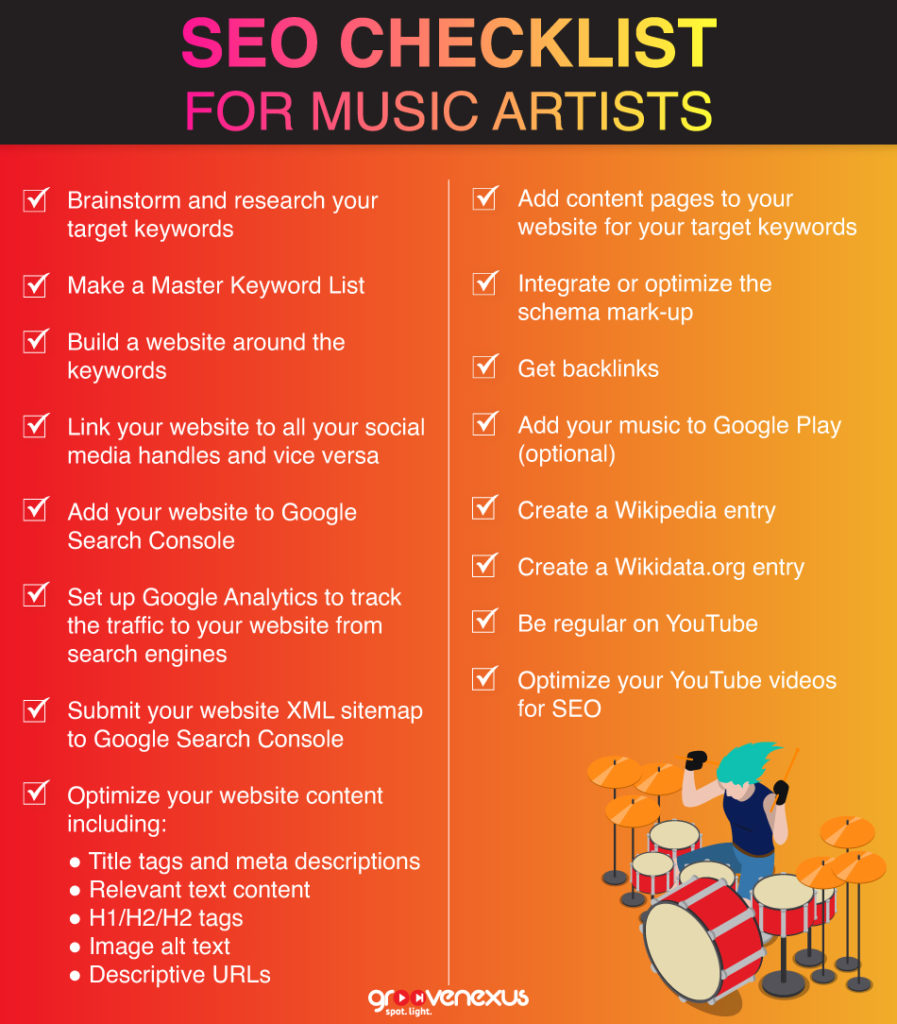
After checking the last element, you might be thinking about how to optimize your video for YouTube? We have not covered it here, though the principle remains the same, still the topic holds its own importance in itself, so check out this blog to give best shot of yours on YouTube.
Conclusion
SEO for music artists is all about setting up your website so that its pages are straightforwardly found and highly ranked by search engines. While traditional marketing avenues and social media promotions are effective for attracting new fans, a properly optimized website with SEO for music artists will raise the bar of your digital fame a notch higher.
Hope you learned something useful about SEO tricks for musicians. GrooveNexus is the hotspot for learning marketing tactics like SEO for music artists and other witty strategies. Groove Connoisseurs are willing to travel the extra span to help you reach a notch higher in the digital world today. With a perfect blend of technology and digital marketing for music artists, we strive to help musicians understand marketing concepts to create a booming experience for their fans and contemporaries.
Subscribe to GrooveNexus to get the latest updates on music marketing hacks and other tips & tricks for digital marketing for musicians, straight in your inbox. If you are an artist and looking for a boost in your career then don’t forget to register yourself as an artist with us


